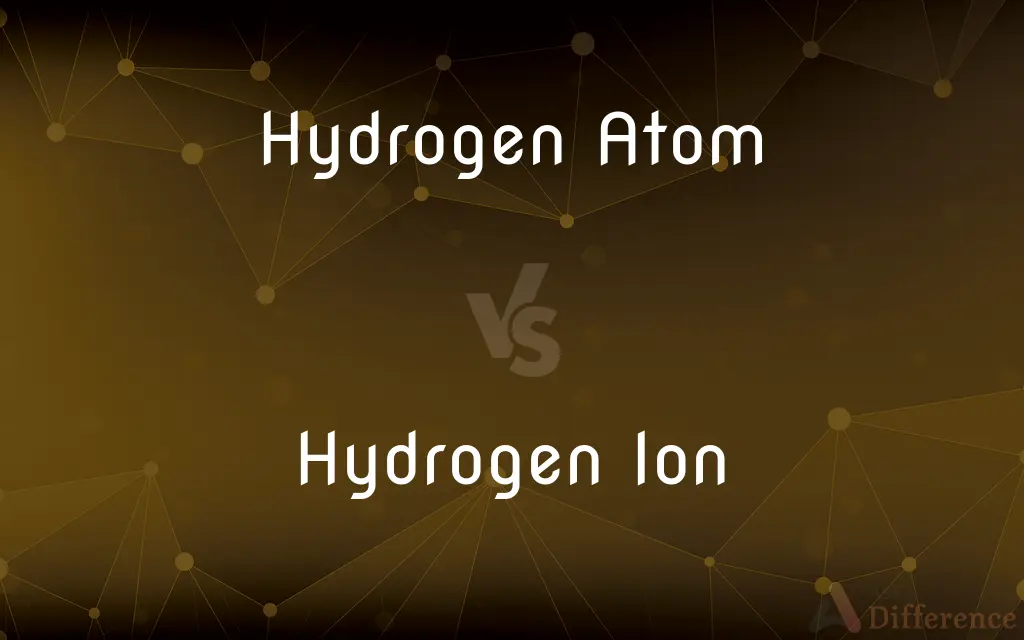Hydrogen Atom vs. Hydrogen Ion — What's the Difference?
By Tayyaba Rehman — Published on November 9, 2023
A hydrogen atom consists of one proton and one electron. A hydrogen ion is a hydrogen atom that has lost its electron, resulting in a positive charge.

Difference Between Hydrogen Atom and Hydrogen Ion
Table of Contents
ADVERTISEMENT
Key Differences
A hydrogen atom is the most basic form of the hydrogen element, and it plays a foundational role in the universe. Comprising one proton and one electron, the hydrogen atom is the lightest and most abundant atom around. Hydrogen atoms can bind with other atoms, forming molecules like water (H2O) and hydrogen gas (H2).
On the other hand, a hydrogen ion is produced when a hydrogen atom loses its electron, leaving behind only the proton. Because of this loss, hydrogen ions carry a positive charge. This ionized form of hydrogen plays a crucial role in various chemical reactions, particularly in acid-base reactions in aqueous solutions.
It's vital to understand that while a hydrogen atom is neutral (no net charge), a hydrogen ion is positively charged due to the absence of its electron. In solutions, hydrogen ions often exist as hydronium ions (H3O+), especially in water, due to the interaction of hydrogen ions with water molecules.
Both the hydrogen atom and the hydrogen ion have unique roles in chemistry. The former is elemental and foundational for the formation of molecules, while the latter drives various reactions and determines the pH level in solutions. Without the interaction and transformation between these two entities, many chemical processes, both in nature and in industrial applications, wouldn't be possible.
Comparison Chart
Composition
1 proton, 1 electron
1 proton, no electrons
ADVERTISEMENT
Charge
Neutral
Positively charged
Presence in water
Exists as H2 molecule
Often as hydronium (H3O+)
Role
Building block of many molecules
Determines pH in solutions
Behavior
Generally stable
Highly reactive
Compare with Definitions
Hydrogen Atom
The primary atom that fuels nuclear fusion in stars.
In stars, hydrogen atoms fuse to produce helium and energy.
Hydrogen Ion
A hydrogen atom that has lost its electron.
When an acid dissolves in water, it releases hydrogen ions.
Hydrogen Atom
A basic unit of hydrogen, comprising one proton and one electron.
The universe primarily consists of hydrogen atoms.
Hydrogen Ion
A positively charged ion.
The concentration of hydrogen ions in a solution determines its pH level.
Hydrogen Atom
The elemental form of hydrogen, devoid of any net charge.
Stars, like our Sun, primarily fuse hydrogen atoms.
Hydrogen Ion
An atom of hydrogen devoid of its electron, often interacting with water to form hydronium ions.
Hydrogen ions in water often combine with water molecules to form hydronium ions.
Hydrogen Atom
The smallest and lightest atom in the periodic table.
Hydrogen atoms form bonds to create the H2 molecule.
Hydrogen Ion
A significant player in acid-base reactions.
Acids increase the concentration of hydrogen ions in solutions.
Hydrogen Atom
A foundational element for various molecules.
Water is formed when hydrogen atoms bond with an oxygen atom.
Hydrogen Ion
An entity determining the acidity or alkalinity of a solution.
The more hydrogen ions present, the more acidic the solution becomes.
Common Curiosities
Are hydrogen atoms charged?
No, hydrogen atoms are neutral because they have equal numbers of protons and electrons.
Why are hydrogen ions positively charged?
Hydrogen ions are positively charged because they consist of just one proton without its accompanying electron.
How do hydrogen ions affect pH?
The concentration of hydrogen ions in a solution determines its pH level.
How is a hydrogen ion formed?
A hydrogen ion is formed when a hydrogen atom loses its electron.
What makes up a hydrogen atom?
A hydrogen atom consists of one proton and one electron.
Can a hydrogen ion exist by itself?
In aqueous solutions, hydrogen ions often associate with water molecules to form hydronium ions.
What's the significance of hydrogen ions in chemistry?
Hydrogen ions play a crucial role in various chemical reactions, especially acid-base reactions.
Are hydrogen ions always present in water?
Hydrogen ions are present in water, especially when acids are dissolved, often existing as hydronium ions.
Can a hydrogen atom exist freely in nature?
Yes, hydrogen atoms can exist freely, often as hydrogen gas (H2) molecules.
What is the role of the hydrogen atom in stars?
Hydrogen atoms are primary fuel for nuclear fusion in stars, producing helium and energy.
How can you detect the presence of hydrogen ions in a solution?
Using pH indicators or pH meters can help detect and measure the concentration of hydrogen ions.
Are hydrogen atoms and hydrogen ions the same?
No, a hydrogen atom is neutral, while a hydrogen ion is a positively charged entity due to the loss of its electron.
How does a hydrogen atom differ from other atoms?
Hydrogen atoms are the simplest, lightest, and most abundant atoms in the universe.
Why are solutions with more hydrogen ions considered acidic?
Solutions with a higher concentration of hydrogen ions have a lower pH, making them acidic.
How do hydrogen atoms create molecules?
Hydrogen atoms can bond with other atoms, forming molecules, such as hydrogen gas (H2) or water (H2O).
Share Your Discovery

Previous Comparison
Sociopathy Personality Disorder vs. Borderline Personality Disorder
Next Comparison
Basic Research vs. Applied ResearchAuthor Spotlight
Written by
Tayyaba RehmanTayyaba Rehman is a distinguished writer, currently serving as a primary contributor to askdifference.com. As a researcher in semantics and etymology, Tayyaba's passion for the complexity of languages and their distinctions has found a perfect home on the platform. Tayyaba delves into the intricacies of language, distinguishing between commonly confused words and phrases, thereby providing clarity for readers worldwide.
















































